
29.6K
Downloads
339
Episodes
The Chills at Will Podcast is a celebration of the visceral beauty of literature. This beauty will be examined through close reads of phrases and lines and passages from fiction and nonfiction that thrills the reader, so much so that he wants to read again and again to replicate that thrill. Each episode will focus on a different theme, such as "The Power of Flashback," "Understatement," "Cats in the Cradle," and "Chills at Will: Origin Story."
Episodes

Friday Apr 09, 2021
Friday Apr 09, 2021
On Episode 51 of The Chills at Will Podcast, Pete has the pleasure to speak with Marinna Benzon, actor and poet. The two discuss her powerful chapbook, Millennial Dogeater, with its themes of gentrification, racial injustice, biculturalism, LGBTQ+ equality, and more.
Show Notes and Links to Marinna Benzon’s Work
Marinna Benzon's Personal Website
Interview with Marinna from Voyage LA
Buy Millennial Dogeater!
Talking Points/Authors/Books Mentioned and Allusions Referenced During the Episode:
At about 3:20, Marinna discusses her background, growing up in the Bay Area, and some of her language and literary influences and interests
At about 10:00, Marinna discusses the texts that have given her “chills at will” throughout her life, including Olivia Gatwood and Rudy Francisco
At about 13:00, Marinna talks about the personal and intimate nature of performing her own poetry, in juxtaposition with
At about 15:00, Marinna talks about how she reads others’ writing a bit differently now that she has published her own chapbook, Millennial Dogeater
At about 16:00, Marinna talks about her daily writing life
At about 17:20, Marinna talks about writing and “catharsis” and her “target audience”
At about 19:00, Marinna talks about the cover design for her chapbook
At about 21:35, Marinna talks about the background of the title of the chapbook and the significance of Jessica Hagdeorn’s Dogeaters in choosing the title
At about 24:35, Marinna talks about writing about herself, versus creating fiction that gives her some personal space”
At about 25:55, Marinna talks about the difficulties and subtleties of ordering of the poems in her book, especially how the Preamble fits in with “Letters to a Former Lover”-four parts, with the “lover” being America
At about 29:00, Marinna talks about body and self image as seen in her poem “Twelve” and the four-part “Letters to a Former Lover”
At about 31:30, Marinna reads “Letters to a Former Lover, Part II”
At about 32:50, Pete and Marinna discuss “Japanese Grandma”
At about 34:10, Marinna talks about her romantic and love poems, and one that is raw and questioning of gender equality, and others that are quietly rebellious in support of justice for people of color and the LGBTQ+ community
At about 38:05, Marinna talks about her poems’ take on gentrification
At about 40:25, Marinna discusses her poem “Brown Girl, Brown Girl”
At about 41:35, Marinna discusses “Small Distractions” and its meanings, and then reads the poem at about 42:15
At about 47:00, Marinna reads “The Casting Director Says” and then discusses Hollywood’s stereotyping and attempts at opening doors for more actors of color
At about 52:10, Marinna talks about upcoming projects
You can now subscribe to the podcast on Apple Podcasts, and leave me a five-star review. You can also ask for the podcast by name using Alexa, and find the pod on Stitcher, Spotify, and on Amazon Music, as well as The Chills at Will Podcast YouTube Channel. Follow me on IG, where I’m @chillsatwillpodcast, or on Twitter, where I’m @chillsatwillpo1.
This is a passion project of mine, a DIY operation, and I’d love for your help in promoting what I’m convinced is a unique and spirited look at an often-ignored art form.
The intro song for The Chills at Will Podcast is “Wind Down” (Instrumental Version), and the other song played on this episode was “Hoops” (Instrumental)” by Matt Weidauer, and both songs are used through ArchesAudio.com.
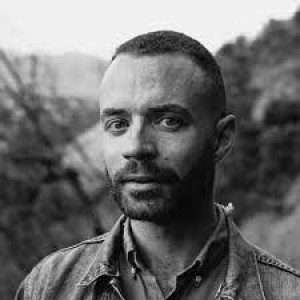
Tuesday Apr 06, 2021
Tuesday Apr 06, 2021
Show Notes and Links to Chris L. Terry’s Work and Allusions/Texts from Episode 50
On Episode 50, Pete welcomes Chris L. Terry, author of 2019’s Black Card and Zero Fade. Chris and Pete discuss Chris’ writing, particularly Black Card, gentrification, his punk rock and reading history, and racism and questions of identity, as seen in the world and in his writing.
Catapult Article: "Tragic Gentrification Mulatto"
Buy Black Card Through Bookshop
At about 3:05, Chris talks about growing up in Richmond, VA, along with his music and literary influences
At about 10:10, Chris talks about the punk aesthetic, what sets it apart from other types of music, and what he drew from it when he was younger
At about 11:40, Chris talks about strains of “Southern Pride”/white supremacist slogans in metal music and how the atmosphere was often alienating
At about 16:00, Pete and Chris talk about punk rock’s more recent history and how Chris got into the punk scene
At about 18:55, Chris talks about his formative writing experiences that later led to
At about 21:05, Chris and Pete shout out librarians, including Chris’ mother
At about 22:05, Chris talks about chill-inducing texts from his childhood and beyond, including “Sonny’s Blues” by James Baldwin, and “Red Wind” by Raymond Chandler
At about 25:30, Chris talks about his work as a screenwriter, writing a script for his novel Black Card
At about 29:45, Chris talks about potential actors to play Lucius, Russell, and Mona in Black Card
At about 30:40, Chris talks about his first novel, Zero Fade
At about 32:40, Chris discusses his insightful essay from Catapult Magazine, “Tragic Gentrification Mulatto,” and the many layers of his neighborhood of View Park, Los Angeles
At about 40:20, Pete and Chris talk about Kanye West’s de(evolution)
At about 42:10, Chris begins to discuss Black Card
At about 44:00, Chris discusses the idea of “performing” as a black man, with regard to the unnamed narrator of the novel
At about 46:40, Chris discusses the character of Lucius and the significance of the titular “black card”
At about 48:30, Chris discusses the interesting character of Mona, her tokenization by the main character, and the way that Chris deals with the archetype of The “Magical Negro” in the novel
At about 52:15, Chris describes the scene in which a father of an acquaintance uses a racist slur and connects it to incidents in his own life
At about 55:25, Chris talks about the book as a “coming-of-age” and “coming-of-race” text, and his desire to represent certain audiences on the page
At about 57:20, Chris reads an excerpt from Black Card
At about 1:02:25, Chris talks about upcoming projects
You can now subscribe to the podcast on Apple Podcasts, and leave me a five-star review. You can also ask for the podcast by name using Alexa, and find the pod on Spotify and on Amazon Music. Follow me on IG, where I’m @chillsatwillpodcast, or on Twitter, where I’m @chillsatwillpo1.
This is a passion project of mine, a DIY operation, and I’d love for your help in promoting what I’m convinced is a unique and spirited look at an often-ignored art form.
The intro song for The Chills at Will Podcast is “Wind Down” (Instrumental Version), and the other song played on this episode was “Hoops” (Instrumental)” by Matt Weidauer, and both songs are used through ArchesAudio.com.
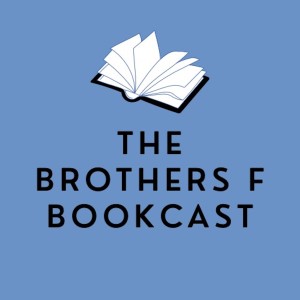
Tuesday Mar 30, 2021
Tuesday Mar 30, 2021
Show Notes and Links to The Brothers Fernandez Work and Allusions/Texts from Episode 49
On Episode 49, Pete talks with the five Fernandez brothers about their love of literature, their awesome family ties, great literature, especially that of Latin America, and their podcast-The Brothers F-which can be found here.
You can now subscribe to the podcast on Apple Podcasts, and leave me a five-star review. You can also ask for the podcast by name using Alexa, and find the pod on Spotify and on Amazon Music. Follow me on IG, where I’m @chillsatwillpodcast, or on Twitter, where I’m @chillsatwillpo1.
This is a passion project of mine, a DIY operation, and I’d love for your help in promoting what I’m convinced is a unique and spirited look at an often-ignored art form.
The intro song for The Chills at Will Podcast is “Wind Down” (Instrumental Version), and the other song played on this episode was “Hoops” (Instrumental)” by Matt Weidauer, and both songs are used through ArchesAudio.com.
The Brothers F Podcast on Apple Podcasts
The Brothers F Podcast Official Website
At about 1:30, Juan Carlos, Andrés, Francisco, Diego, and Juan Pablo give their background
At about 3:00, the brothers talk about their childhood background with reading and the full bookshelves at home, and they shout out some of their favorite books, comic strips, authors, and texts
At about 16:00, the brothers talked about the books and texts that have given them “chills at will,” including Laura Hillebrand’s incredible and impeccable Unbroken, Agatha Christie’s short stories, Virginia Wolff’s Mrs. Dalloway, William Faulkner’s The Sound and The Fury, Tolkien’s The Lord of the Rings, “La Escritura de Dios” by Jorge Luis Borges, and “Good Old Neon” by David Foster Wallace.
At about 23:00, Pete talks about his love of Unbroken, including the many parallels between Louis Zamperini and Pete’s grandpa, Joe Albanese
At about 27:45, the brothers talk about their podcast, including its origins and its philosophy
At about 32:05, the brothers discuss George Saunders’ greatness
At about 36:45, Juan Pablo, an 8th-grader (!), talks about his reading list
At about 38:15, Pete uses the formative text, Cinco Maestros, to discuss great works in Spanish, including “El Evangelio Según Marcos” by Jorge Luis Borges, which Pete covered here on Episode Seven and “No Oyes Ladrar Los Perros” by Juan Rulfo, which Pete covered here on Episode Three
At about 44:50, Francisco talks about his and the family’s hopes in connecting to more literature in Spanish
At about 51:00, Pete talks about some incredible short stories by Gabriel Garcia Marquez, including the allusion-rich, symbolism-heavy “El Ahogado Más Hermoso del Mundo,” and “Alguien Desordena Estas Rosas,” which Pete covered here in Episode Four
At 1:01:10, the brothers talk about upcoming projects and episodes
At 1:04:10, the brothers talk about their process in getting the five bros together for recording their podcasts

Tuesday Mar 23, 2021
Tuesday Mar 23, 2021
Show Notes and Links to Martina Testa’s Work and Allusions/Texts from Episode
On Episode 48, Pete welcomes Martina Testa, who has translated many American authors into Italian, including David Foster Wallace, Cormac McCarthy, Jonathan Lethem, Jennifer Egan, and Kurt Vonnegut. She translates for Edizioni Sur.
The two talk about Martina’s love of literature, translation as an art, David Foster Wallace-his greatness and the specific difficulties of translating his work into Italian-and much more.
Martina Testa’s Website
Interview with Martina (in Italian)
Martina Testa on The Great Concavity Podcast, discussing David Foster Wallace
Edizioni Sur, where Martina works
At about 1:40, Martina talks about her reading life during her childhood, including reading from an incredibly early age-she was, she says “in love with reading”
At about 3:30, Martina talks about her mostly self-guided learning of English
At about 4:15, Martina talks about Little Women, 1984, and other favorite books from her childhood
At about 8:20, Martina talks about contemporary work that she has enjoyed in the last ten years or so, including Colson Whitehead, George Saunders, and Jennifer Egan
At about 9:50, Martina talks about the specific literary culture of Italy, and its emphasis on intellectual, and not commercial, fiction
At about 13:40, Pete and Martina talk about Christ Stopped at Eboli, Martin Eden, the Italian film, and other recommendations
At about 15:10, Martina and Pete talk about the idea of translators as conduits and interpretes,
At about 17:55, Martina talks about her process for, and philosophy of, translation
At about 21:00, Martina talks about translating great authors who she knows were so careful in every way with their diction, versus those who write sloppily and she has to translate; she also talks about
At about 24:00, Pete and Martina talk about Episode 42 guest, Edoardo Ballerini’s, definition of interprete, and Martina talks about how she sees the term similarly
At about 25:15, Martina talks about her introduction to David Foster Wallace, and how he became the first writer she ever translated
At about 29:30, Martina talks about how working on translation for David Foster Wallace led to her career as a translator and editor
At about 30:30, Martina talks about meeting David Foster Wallace on a few occasions
At about 34:25, Martina talks about what has drawn her to Wallace’s writing, especially his incredible mental acuity and curiosity and his original style of writing
At about 36:55, Pete and Martina talk about the title essay of A Supposedly Fun Thing that I’ll Never Do Again, a towering achievement-funny, sad, etc.
At about 39:05, Martina talks about Infinite Jest and its history in translation in Italy
At about 42:10, Pete and Martina read and discuss excerpts of Martina’s translation of “John Billy” from Wallace’s collection called The Girl with Curious Hair, and Martina talks about her process in searching for ways to translate and put Wallace’s work into Italian in the early days of the Internet
At about 51:10, Pete and Martina read and discuss excerpts of Wallace “E Unibus Pluram,” from the collection A Supposedly Fun Thing that I’ll Never Do Again and Martina’s translation of the piece
At about 58:40, Martina talks about translating from an Anglo-Saxon/Germanic-based language like English into a Romance language like Italian
At about 1:00:25, Martina talks about upcoming projects, including translation of Bernadine Evaristo
You can now subscribe to the podcast on Apple Podcasts, and leave me a five-star review. You can also ask for the podcast by name using Alexa, and find the pod on Spotify and on Amazon Music. Follow me on IG, where I’m @chillsatwillpodcast, or on Twitter, where I’m @chillsatwillpo1.
This is a passion project of mine, a DIY operation, and I’d love for your help in promoting what I’m convinced is a unique and spirited look at an often-ignored art form.
The intro song for The Chills at Will Podcast is “Wind Down” (Instrumental Version), and the other song played on this episode was “Hoops” (Instrumental)” by Matt Weidauer, and both songs are used through ArchesAudio.com.
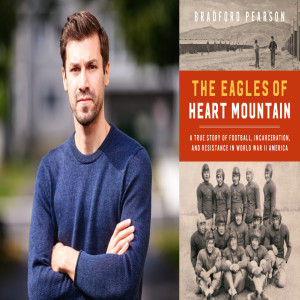
Tuesday Mar 16, 2021
Tuesday Mar 16, 2021
Show Notes and Links to Bradford Pearson’s Work and Allusions/Texts from Episode 47
On Episode 47, Pete talks with Bradford Pearson about his writing journey, his research on the Japanese-American “internment camps” (the two talk about this fraught phrasing), and his recent engrossing, finely-drawn. and thoroughly-researched book The Eagles of Heart Mountain: A True Story of Football, Incarceration, and Resistance in World War II America.
Bradford Pearson is the former features editor of Southwest: The Magazine. He has written for The New York Times, Esquire, Time, and Salon, among many other publications. He grew up in Hyde Park, New York, and now lives in Philadelphia. The Eagles of Heart Mountain is his first book and was published January 5 of this year. The book has been reviewed favorably in The Washington Post, who called the book “an absolutely stirring story.” Of the book, Publishers’ Weekly wrote, “Pearson succeeds in unearthing a feel-good story from a dark chapter in U.S. history. The result is a worthy portrait of triumph in the face of tragedy.”
Buy The Eagles of Heart Mountain (Bookshop.org)
Buy The Eagles of Heart Mountain (Amazon)
Bradford's Article: "What Happened After My Kidnapping" from 2015, in Philadelphia City Life
At about 3:20, Bradford Pearson talks about growing up in Hyde Park, NY, and his literary childhood and adolescence; he shouts out his transformative English teacher, (Mr. Briggs!) and the change in his love for literature that came with reading the great Moby Dick
At about 8:10, Brad talks about George Yoshinaga, a main character in The Eagles of Heart Mountain, and his incredible journalism career
At about 9:30, Brad talks about his athletic career, including his crew/rowing background
At about 10:40, Brad traces his writing journey from late high school/college to his professional writing days
At about 12:00, Brad talks about the origins and inspiration for The Eagles of Heart Mountain
At about 13:30, Brad talks about the writers who have inspired him and continue to inspire him, including Cormac McCarthy, Denis Johnson, Valeria Luiselli, Patrick Radden Keefe, Nick Paumgarten, and Bryan Washington
At about 19:00, Brad talks about how his reading experiences are different when he’s in the middle of writing his own book and reading in general as he is also a writer
At about 23:20, Brad describes the horrific event and subsequent article, called “What Happened after my Kidnapping,” based on the event
At about 28:00, Brad talks about the importance of Keiichi Imura’s contributions to the book and how his further descriptions of George “Horse” Yoshinaga and Babe Nomura “grounded” the story for Brad; additionally, Brad talks about the incredible help provided by Bacon Sakitani and the Heart Mountain Interpretive Center
At about 34:25, Brad talks about the positive and meaningful feedback he’s received regarding The Eagles of Heart Mountain
At about 37:00, Brad talks about the ways in which the book tells about a small slice of sporting life while also covering the greater tragedies of the Japanese-American internment and the racism leading up to it
At about 39:30, Brad talks about the importance of labels and what nomenclature is considered “correct” when referencing the removal of Japanese and Japanese-Americans from the West Coast during WWII
At about 42:30, Brad talks about the importance of sports at Heart Mountain Camp
At about 46:20, Brad talks about parallels between the events of the book and contemporary goings-on, including similar disinformation campaigns that fueled the hatred
At about 48:50, Pete and Brad talk about the twisted and circular reasoning used by both “election fraud” devotees of 2020 and those who advanced the racist and xenophobic tropes that led to the horrific mistreatment of the Japanese and Japanese-Americans during WWII
At about 50:45, Brad discusses some craft points, including the ways in which Brad began each chapter
At about 56:05, Brad reads a section from The Eagles of Heart Mountain, a beautiful flashback scene from a football game at Heart Mountain
At about 1:01:10, Brad talks about upcoming projects
You can now subscribe to the podcast on Apple Podcasts, and leave me a
five-star review. You can also ask for the podcast by name using Alexa, and find the pod on Spotify, Stitcher, and on Amazon Music. Follow me on IG, where I’m @chillsatwillpodcast, or on Twitter, where I’m @chillsatwillpo1.
This is a passion project of mine, a DIY operation, and I’d love for your help in promoting what I’m convinced is a unique and spirited look at an often-ignored art form.
The intro song for The Chills at Will Podcast is “Wind Down” (Instrumental Version), and the other song played on this episode was “Hoops” (Instrumental)” by Matt Weidauer, and both songs are used through ArchesAudio.com.

Friday Mar 12, 2021
Friday Mar 12, 2021
Show Notes and Links to Rowena Galavitz’s Work and Allusions/Texts from Episode 46
On Episode 46, Pete talks with Rowena Galavitz about her varied and engrossing interests, including literature and arts of many kinds. The two delve deep into Rowena’s vocation as an editor and translator, as Rowena shares some of her translations, as well as her process for doing said translation.
Rowena Galavitz worked as a typesetter/proofreader in New York City in the 80s, when she created art books for museums such as the Metropolitan Museum of Art and educational books for publishers such as Scholastic and while she enjoyed the art and punk rock scene of the city. When she moved to Oaxaca, Mexico, she edited, translated, or oversaw the production of coffee table art books and art catalogues about Mexican art. In Mexico City, she worked as a subtitle editor doing closed captioning for films and TV series. In the literary world, her experience includes the translation of Latin American short stories and poetry. Some of her poetry translation won a World Literature Today Prize in 2018. In her current editing and translation work, she focuses broadly on the arts and humanities and specifically on contemporary Mexican and early modern Spanish culture.
Enthusiastic and knowledgeable about literary and religious texts in the early modern world, her scholarly pursuits about women writing in Spanish have entailed archival research in Mexico and Spain, which resulted in a master’s thesis on Hipólita de Jesús (1551-1624), a Barcelona nun who wrote over twenty books. Her archival research in Peru manifested in multiple presentations on a collage by Rosa de Lima (1586-1617), about which she is currently writing a journal article. Her theoretical interests include gender and sexuality, intersectional feminism, and translation theory.
She has taught classes at the university level in English as a Second Language, English composition, and Intermediate Spanish. And she has developed syllabi on courses such as: Women Who Wrote: Literature and Religion in the Premodern World, The Long History of the End of the World, and Radical Women. She loves to teach students about how language and literature work, and she is particularly at ease when she teaches about a wide range of texts on a single theme from different historical periods.
Parallel to her editorial and educational work, she created literature-inspired art in a variety of media for three decades, mostly in Mexico, where she held five one-woman exhibits, and she participated in over 60 group shows.
At around 4:55, Rowena talks about growing up in a small town, and her grandparents’ influence on her, as they were big patrons of the library; Rowena also talks about the artistic sensibility that has been with her from an early age
At around 6:20, Rowena talks about how her Spanish learning and interest blossomed
At around 8:30, Rowena talks about her days living, researching, translating, learning, and creating in Oaxaca and México City
At around 11:30, Rowena talks about writers who have thrilled her through the years, including Richard Wright and his Native Son, A Journal of The Plague Year by Daniel DeFoe, Valeria Luiselli’s Tell Me How it Ends, Merce Redoreda's Mirall Trencat, and Manuel Astur’s San, El Libro de los Milagros.
At around 14:40, Rowena talks about her schedule as a translator/editor
At around 16:05, Rowena talks about the process, art, and science of translating and the “decisions” she makes
At around 22:15, Rowena talks about how she researches and uses historical context in her translation, including things that may not match up with 2021’s societal norms
At around 26:30, Rowena talks about balancing the different forms of spoken Spanish as she does her translations
At around 29:00, Rowena talks about some of her favorite genres to work with in translation
At around 31:00, Rowena talks about how she reads other translator’s work and working with closed captioning and subtitles
At around 33:10, Rowena talks about the Catalan language and her learning of the language
At around 35:00, Pete and Rowena read an excerpt of the English and Spanish translation done by Rowena of “La Ciudad Lucía” by Paula Ilabaca Nuñez, also discussing Rowena’s thought process in doing the translation as she highlights alliteration, enjambments, etc.
At around 41:15, Rowena talks about her future projects, including translating some work by the great Sor Juana Inés de la Cruz and Elena Poniatowska and Javier Sicilia
At around 43:00, Pete and Rowena talks about the subtleties of “tú” and “Ud.” and its peculiarities in translation as seen in the great story by Juan Rulfo, “No Oyes Ladrar los Perros”-check out Pete’s earlier episode about this story
You can now subscribe to the podcast on Apple Podcasts, and leave me a five-star review. You can also ask for the podcast by name using Alexa, and find the pod on Spotify and on Amazon Music. Follow me on IG, where I’m @chillsatwillpodcast, or on Twitter, where I’m @chillsatwillpo1.
This is a passion project of mine, a DIY operation, and I’d love for your help in promoting what I’m convinced is a unique and spirited look at an often-ignored art form.
The intro song for The Chills at Will Podcast is “Wind Down” (Instrumental Version), and the other song played on this episode was “Hoops” (Instrumental)” by Matt Weidauer, and both songs are used through ArchesAudio.com.

Friday Mar 05, 2021
Friday Mar 05, 2021
Show Notes and Links to Keegan Hamilton’s Work and Allusions/Texts from Episode
On Episode 45, Pete talks with Keegan Hamilton about his reporting for Vice News. The conversation focuses on his work for three thorough, shocking, engrossing, and nuanced multimedia pieces about the trial of El Chapo, fentanyl’s explosive growth in the US and abroad, and recent developments and fighting in Micoachan, México’s “Tierra Caliente,” fifteen years after Felipe Calderón declared “war” on the cartels.
Keegan Hamilton is a senior reporter, podcast host, and Emmy-nominated producer at VICE News, where he covers organized crime, prisons, and the drug trade.
Keegan Hamilton's Personal Website with Links to His Work
Vice News Article: "On the Front Line of Mexico’s Forever War Against the Cartels" by Keegan Hamilton and Miguel Fernández-Flores
YouTube trailer for “Painkiller: America’s Fentanyl Crisis,” a Spotify podcast series, found here
Chapo: Kingpin on Trial Podcast
At around 2:00, Keegan talks about his role as a “senior editor” at Vice News
At around 2:40, Keegan talks about his beginnings of journalism, and his love for Jack McCallum and Frank DeFord and other great writers for his beloved Sports Illustrated
At around 4:20 (coincidentally!), Keegan talks about his work at alt-weeklies and how they have informed his own writing and local alt-weeklies’ role in advancing narrative nonfiction and long-form, nuanced pieces
At around 7:00, Keegan talks about writers who have inspired him and continue to inspire him, including Charles Bowden, Terrence Papá, Ioan Grillo, and Sam Quinones
At around 11:40, Keegan talks about his view of himself as what it means to be a “writer” and “journalist,” particularly with the acceleration of multimedia in recent years
At around 14:00, Keegan talks about his writing work during the pandemic
At around 16:00, Keegan talks about Vice and their target audience(s)
At around 17:00, Keegan talks about his podcasting techniques and what’s he’s learned about the mechanics of the medium
At around 19:45, Keegan and Pete discuss the romanticization of organized crime figures, including “El Chapo,” whose U.S. trial Keegan covered in a recent Vice podcast series, as well as common misconceptions about the drug trade and its participants
At around 25:20, Keegan discusses the importance of speaking Spanish pretty well and his valuable and helpful translators, including producer Miguel Fernandez
At around 27:00, Keegan describes the thesis/pitch for the Vice News podcast/article/project chronicling 15 years of the “drug war” in Michoacán, México
At around 29:35, Pete and Keegan talk about some rays of hope in the story of the drug war, and a well-written scene at the end of Keegan’s article on Michoacán that shows a possible more tranquil future in La Tierra Caliente
At around 30:35, Pete and Keegan talk about the Michoacán autodefensas and the role of indigenous communities in forming strong groups for security and self-sufficiency
At around 32:40, Pete and Keegan discuss the role and responsibility of The United States in the “drug war,” as the users of the illicit drugs are overwhelmingly in the US
At around 34:50, Pete and Keegan toss around ideas for Keegan’s next project(s)
You can now subscribe to the podcast on Apple Podcasts, and leave me a five-star review. You can also ask for the podcast by name using Alexa, and find the pod on Spotify and on Amazon Music. Follow me on IG, where I’m @chillsatwillpodcast, or on Twitter, where I’m @chillsatwillpo1.
This is a passion project of mine, a DIY operation, and I’d love for your help in promoting what I’m convinced is a unique and spirited look at an often-ignored art form.
The intro song for The Chills at Will Podcast is “Wind Down” (Instrumental Version), and the other song played on this episode was “Hoops” (Instrumental)” by Matt Weidauer, and both songs are used through ArchesAudio.com.
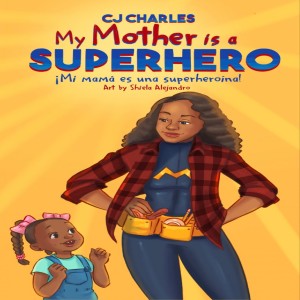
Tuesday Mar 02, 2021
Tuesday Mar 02, 2021
Show Notes and Links to CJ Charles’ Work
On Episode 44, Pete is happy to welcome the author of My Mother Is a SUPERHERO/¡Mi Mamá Es Una Superheroína!, Caryn “CJ” Charles.
CJ Charles is a native of Los Angeles and a proud child of the 80's and 90's! She is a writer, Spanish teacher, and educational consultant. From an early age, her mother taught her to read and appreciate books. CJ's been story writing since the first grade. My Mom is a Superhero is a love letter to her mother and an ode to supermoms everywhere! She hopes you enjoy getting to know her characters in her debut children's book.
Buy My Mother Is a SUPERHERO/¡Mi Mamá Es Una Superheroína!
Book Review in Kidlio Magazine
At around 3:00, Caryn talks about how she was introduced to Spanish at an early age, and her constant exposure to print media and books as a kid; she also talks about teachers and students (and her mom!) being surprised by her Spanish prowess
At around 8:15, Caryn talks about having pride in being an African-American Spanish teacher and finding so many connections
At around 11:00, Caryn talks about what she was reading as a kid, and which writers and texts thrilled
At around 13:55, Caryn talks about her high school and college reading and her early writing that recreated her real life
At around 14:55, Caryn talks about a major change in her fields of study in college
At around 17:55, Caryn discusses her 2021 reading
At around 18:55, Caryn discusses the inspirations for (her incredible Mom who inspires her daily!) and the beginnings of her book, My Mother Is a SUPERHERO/¡Mi Mamá Es Una Superheroína!
At around 20:45, Caryn explains the importance of superheroes in her life and the need to let children know that superheroes are all around us
At around 21:45, Caryn discusses how she and Shiela Alejandro connected and shared their visions
At around 23:30, Caryn writes about rhyming in her book and her thought process and research, as well as how writing for a younger age opened up her creativity
At around 28:15, Caryn talks about her mother’s reaction to Caryn’s book, a tribute to her beloved mom
At around 29:00, Caryn talks about the storyline of the book
At around 30:10, Caryn discusses her rationale for making her narrator the age she did
At around 31:20, Caryn discusses how she finally threw out the idea of a confining structure for her book, and how writing more freely helped the story come alive
At around 34:15, Caryn discusses how she balanced the different types of Spanish in writing her book
At around 36:55, Caryn discusses the balance between commercialism and art with her book, and her desire to provide readers with diverse characters of color representative of many cultures and groups
At around 41:15, Caryn talks about her second book that she is finishing-the teacher as a superhero!
At around 43:15, Caryn reads from My Mother Is a SUPERHERO/¡Mi Mamá Es Una Superheroína!
If you have enjoyed The Chills at Will Podcast, pause your podcast player right now, and go to Apple to leave me a nice review.
You can also ask for the podcast by name using Alexa, and find the pod on Spotify and on Amazon Music, and (new this week!) on Stitcher. Follow me on IG, where I’m @chillsatwillpodcast, or on Twitter, where I’m @chillsatwillpo1.
This is a passion project of mine, a DIY operation, and I’d love for your help in promoting what I’m convinced is a unique and spirited look at an often-ignored art form.
The intro song for The Chills at Will Podcast is “Wind Down” (Instrumental Version), and the other song played on this episode was “Hoops” (Instrumental)” by Matt Weidauer, and both songs are used through ArchesAudio.com.
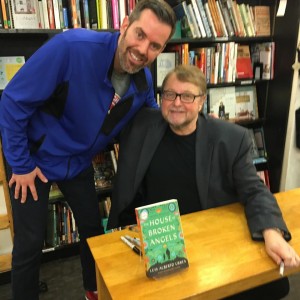
Monday Feb 22, 2021
Monday Feb 22, 2021
Show Notes and References From Episode 43
On Episode 43, Pete is honored to speak with Luis Alberto Urrea, award-winning writer, educator, humanitarian, and one heck of a humorous and generous guy. The two discuss a myriad of topics, with many revolving around his most recent book, The House of Broken Angels, an emotionally-shattering, frenetic, and gorgeous novel, and his Pulitzer Prize-nominated nonfiction work, The Devil’s Highway.
-at about 6:40, Luis talks about growing up in Tijuana as an “artsy kid” who was “infected with a desire for art,” writing and drawing
-at about 10:10, Luis talks about his incredible encounter with Ursula LeGuin (regarding a piece that he wrote about his father’s death) that changed his life
-at about 14:05, Luis recounts another life-changing event in his literary life, involving friends and a pivotal question from an early reader of his
-at about 16:25-Luis talks about his father’s attempts at getting Luis to read more texts en español and the “culture war” inside his house
-at about 19:05-Luis talks about writing about his father’s tragic death
-at about 24:45-Luis talks about those writers and texts who brought him “chills at will,” starting with hearing Dickens as a kid, read by his mother, “seeing waves of the ocean formed by words”
-at about 27:25-Luis talks about more chill-inducing reading-his love of Poe and Ambrose Bierce and being blown away by Ray Bradbury
-at about 29:30-Luis talks about the beauty and surrealism of being accepted into the “Writers’ Club”
-at about 30:30-Luis talks about the community of writers and his experience in his early days of writing and work in the community, including his connection with Alurista, Father Cesar Gonzalez, Rudolfo Anaya, Juan Felipe Herrera, and more-this time is what he calls his “training period” and “all about service”
-at about 34:45, Luis talks about an interesting character, Dave, from The House of Broken Angels, and his connection to real-life Jesuit activist Father Dave Ungerleider
-at about 37:25, Luis discusses being in service, as a bicultural and bilingual person who has built “bridges, rather than borders”
-at about 39:25, Luis discusses The Devil's Highway and how he came to be the writer of such a book
-at about 43:20, Luis talks about his early wariness on both sides with Border Patrol as he researched the book, as well as the work of researching
-at about 53:40, Luis talks about looking back at Devil’s Highway years later and all that entails
-at about 55:00, Pete and Luis talk about Luis’ use of second person narration to great effect, and Luis talks about the inspirations/motivations for second person, including his admiration for the way his friend Stewart O’Nan uses it in The Names of the Dead
-at about 56:10, Luis talks about the incredibly-affecting scene in The Devil’s Highway in which the four stages of heat stroke, as experienced by the Yuma 14, are explained in great detail
-at about 58:35, Luis talks about The House of Broken Angels and why he has called the real-life experiences that inspired the book “The Mexican Finnegan’s Wake”
-at about 1:04:45, Pete and Luis talk about some of the humor that permeates the novel, as well as the book’s addendum, a DelaCruz family tree
-at about 1:07:50, Luis and Pete talk about the use of “carnal” in the book and the book’s utter carnality, which is part of what makes the book so riveting
-at about 1:12:35, Luis discusses the pivotal, flawed, lovable, and charismatic character of Big Angel in the novel, including connection between Don Corleone, The Godfather, and Luis’ father
-at about 1:14:50, Luis explains the background of the beautiful and pivotal scene in The House of Broken Angels where Big Angel and Little Angel lay in bed together and discuss life
-at about 1:17:30, Luis explains his approach in writing the book’s Coda, including inspiration provided by Respighi's "Fountains of Rome"
-at about 1:20:45, Luis discusses his upcoming book, a “World War II epic, inspired by [his] mother’s service in The Red Cross.”
You can now subscribe to the podcast on Apple Podcasts, and leave me a five-star review. You can also ask for the podcast by name using Alexa, and find the pod on Spotify and on Amazon Music. Follow me on IG, where I’m @chillsatwillpodcast, or on Twitter, where I’m @chillsatwillpo1.
This is a passion project of mine, a DIY operation, and I’d love for your help in promoting what I’m convinced is a unique and spirited look at an often-ignored art form.
The intro song for The Chills at Will Podcast is “Wind Down” (Instrumental Version), and the other song played on this episode was “Hoops” (Instrumental)” by Matt Weidauer, and both songs are used through ArchesAudio.com.

Friday Feb 19, 2021
Friday Feb 19, 2021
Show Notes and Links to Edoardo Ballerini’s Work and Allusions/Texts from Episode
On Episode 42, Pete talks with Edoardo Ballerini about a myriad of topics, all revolving around art and creativity in some way. They discuss Edoardo’s artistic upbringing, language and translation, his writing for film and other forms, his acting, his award-winning narration of audiobooks and newspaper articles, his literary inspiration, and much more.
Edoardo Ballerini, described on multiple occasions as “The Golden-Voiced Edoardo Ballerini,” is a two time winner of the Audiobook Publishers Association’s Best Male Narrator Audie Award (2013, Beautiful Ruins, by Edoardo Ballerini; 2019, Watchers by Dean Koontz). He has recorded nearly 300 titles, including classic works by Tolstoy, Dante, Stendhal, Kafka, Calvino, Poe, Emerson, Whitman and Camus, best-sellers by James Patterson and David Baldacci, modern masterpieces by Tom Wolfe, Karl Ove Knausgaard, and André Aciman, and spiritual titles by The Dalai Lama and Thich Nhat Hahn.
On screen, Ballerini is best known for his role as junkie "Corky Caporale" on The Sopranos (HBO) and as the star chef in the indie classic Dinner Rush. He has appeared in over 50 films and tv shows, including a series regular role in the critically acclaimed Quarry, (Cinemax) and recurring roles in Boardwalk Empire (HBO), 24 (Fox) and Elementary (CBS).
Ballerini's work as a narrator has garnered international attention. Articles on his work and career have appeared in The New York Times (US), The Guardian (UK), Aftenposten (Norway) and MediaPost (US), among others. In 2019 he recorded Robert Alter’s translation of The Hebrew Bible in its entirety. In 2020 he added Leo Tolstoy's War and Peace to his growing list of titles.
He is also a two time winner of the Society of Voice Arts Award, and was recently named a “Golden Voice” by AudioFile Magazine, an honorific bestowed to only 35 narrators in the magazine’s 20 year history.
Other authors Edoardo has voiced include Chuck Palahniuk, Eve Ensler, Carson McCullers, Jay McInerney, Stephen Greenblatt, Jeffrey Deaver, Danielle Steel, Chuck Palahniuk, Louis L’Amour, Adriana Trigiani, Isabel Allende, Stieg Larsson, James Salter, Paul Theroux and Jodi Picoult.
Besides narrating audiobooks, Edoardo is also a regular contributor to Audm, where he narrates the best in long-form journalism for The New York Times, The New Yorker, Vanity Fair, Atlantic Monthly, The London Review of Books, and many other publications.
He is a graduate of Wesleyan University and lives in New York.
Edoardo Ballerini reads an excerpt from Martin Eden by Jack London
Edoardo Ballerini's Personal Website
Edoardo Ballerini on Italics-”The Voice of God” Video
Edoardo Ballerini reads Beautiful Ruins, Chapter One-YouTube excerpt
-at about 4:35, Edoardo describes his life growing up among family in New York and Milan, as well as growing up with artsy and creative parents and their parents’ artistic friends
-at about 6:45, Edoardo talks about his dual identities as Italian-American (or “Italian AND American”), as well as his love of language being fueled by growing up bilingual/multilingual
-at about 9:35, Edoardo talks about his reading interests as a kid, including myths, followed by a “dip away” into math and science, and then a return to poetry in high school and then his interest in being a writer in late adolescence
-at about 11:25, Edoardo talks about the importance of “place” in his writing, acting, and other art
-at about 14:05, Edoardo talks about the literature that has given him “chills at will,” especially the “book that changed [his] life”-Joyce’s Ulysses
-at about 17:10, Edoardo talks about being a man of many talents and interests, and he hones in on audiobook narration and the importance and tough balance of being an interprete as an audiobook narrator
-at about 21:05, Edoardo talks about what it means on a daily basis to be a “creative”
-at about 24:25, Edoardo talks about his mom’s influence on him as she was a photo historian, especially with regard to him becoming an actor, a visual and literary medium
-at about 25:55, Edoardo talks about his beginnings as an actor
-at about 27:45, Edoardo talks about his beautiful interaction with Aaliyah during the filming of Romeo Must Die
-at about 29:40, Edoardo talks about his run of four episodes on The Sopranos, including the incredible circumstances involved in filming a crucial scene with Michael Imperioli as a relapsing Christopher Moltisanti
-at about 34:45, Edoardo talks about his role as Ignatius D’Alessio in Boardwalk Empire, including how the run ended
-at about 36:25, Edoardo talks about the movie in which he starred and that he directed, Good Night, Valentino
-at about 44:05, Edoardo talks about how he got started as an audiobook narrator about 10 years ago, which coincided with the growth of the iPod, iPhone, Audible.com, etc.
-at about 47:35, Edoardo talks about continuity and recording long books
-at about 49:50, Edoardo talks about “one of the luckiest breaks of [his] life” in getting to narrate (and doing a stellar and award-winning job) Jess Walter’s Beautiful Ruins
-at about 54:00, Edoardo talks about his love for Martin Eden by Jack London, the wonderful recent Italian movie adaption, and Edoardo’s recording of Martin Eden on audiobook
-at about 1:01:50, Edoardo thrills with a reading from Martin Eden
-at about 1:03:25, Edoardo talks future projects and laughs in response to The New York Times dubbing his voice “The Voice of God…”
You can now subscribe to the podcast on Apple Podcasts, and leave me a five-star review. You can also ask for the podcast by name using Alexa, and find the pod on Spotify and on Amazon Music. Follow me on IG, where I’m @chillsatwillpodcast, or on Twitter, where I’m @chillsatwillpo1.
This is a passion project of mine, a DIY operation, and I’d love for your help in promoting what I’m convinced is a unique and spirited look at an often-ignored art form.
The intro song for The Chills at Will Podcast is “Wind Down” (Instrumental Version), and the other song played on this episode was “Hoops” (Instrumental)” by Matt Weidauer, and both songs are used through ArchesAudio.com.
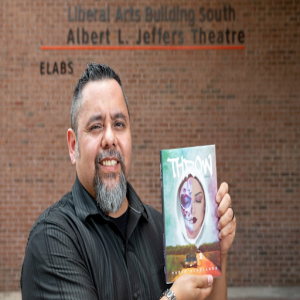
Monday Feb 15, 2021
Monday Feb 15, 2021
Show Notes and Links to Ruben Degollado’s Work and Allusions/Texts from Episode
On Episode 41, Pete welcomes Ruben Degollado, author of 2019’s Throw, a gripping, heartfelt, and profound book that deserves a place in every library and high school English classroom. Ruben and Pete discuss Ruben’s history in the Río Grande Valley, ideas around identity, pochismo, representation in literature and the media, his fictional piece about the iconic Selena Quintanilla, his blockbuster Throw, redemption, the genre of young adult fiction, Ruben’s exciting upcoming projects and much more.
Ruben’s Website
Buy Throw Through Amazon
Buy Throw Through Bookshop
Buy Dreaming: A Tribute to Selena Quintanilla Pérez
-at about 3:30, Ruben talks about growing up in McAllen, Texas, pochismo, and his language background
-at about 6:30, Ruben talks about the interplay between Spanish and English in his writing
-at about 9:15, Ruben talks about the connotations of the term pocho, and the “third country” of the Río Grande Valley, being in the physical location that it is
-at about 11:30, the above leads to discussion of the beloved Pocho by José Antonio Villarreal, as well as the books and writers that interested Ruben as a kid and an adolescent
-at about 14:20, Ruben talks about the incredible change in his writing and reading when he first read Sandra Cisneros’ work when he was in college
-at about 15:40, Ruben talks about Oscar Cásares, whose book Brownsville, among others, has given him “chills at will” and spoken to him so profoundly
-at about 17:50, Ruben talks about the “lightbulb moment” when he was published for the first time at UT-Pan American’s Gallery student literary journal, which was such a proud moment and catapulted him into writing as a more serious pursuit
-at about 21:00, Ruben talks about his early writing being “more like auto fiction”
-at about 22:40, Ruben talks about mentors and writing supporters like Rene Saldaña,
-at about 24:20, Ruben talks about his schedule and routine as a writer
-at about 25:40, Ruben talks about his piece “La Milagrosa Selena,” anthologized in Dreaming: A Tribute to Selena Quintanilla Pérez and how he has some characters who show up in multiple texts of his
-at about 31:30, Ruben reads his piece “La Milagrosa Selena” and discusses her legacy, as well as the recent Netflix series
-at about 42:22, Ruben discusses the background and ideas for Throw, including the minor and major characters and their storylines, characteristics and analogues; this also leads to a discussion of those Chicanos who speak Spanish fluently and others who don’t and issues of identity around this
-at about 50:20, Ruben discusses the main character of “Llorona”/Karina, the dichotomy of her personality, and her connections to the Legend of La Llorona
-at about 53:45, Ruben discusses Young Adult as a genre and giving young readers more credit as deep thinkers, and Pete reads a couple of profound observations from characters in Throw to illustrate Ruben’s point
-at about 55:40, Ruben discusses the “father figure”/”cautionary tale” character of Benny and the inspiration for the character; this goes with the book’s theme of redemption that Ruben talks about
-at about 59:15, Ruben reads, and he and Pete discuss the resonance of the moving excerpt from Throw
-at about 1:03:50, Ruben talks about his two major upcoming projects, including his literary adult book coming out-The Family Izquierdo-and a sequel/prequel to Throw
You can now subscribe to the podcast on Apple Podcasts, and leave me a five-star review. You can also ask for the podcast by name using Alexa, and find the pod on Spotify and on Amazon Music. Follow me on IG, where I’m @chillsatwillpodcast, or on Twitter, where I’m @chillsatwillpo1.
This is a passion project of mine, a DIY operation, and I’d love for your help in promoting what I’m convinced is a unique and spirited look at an often-ignored art form.
The intro song for The Chills at Will Podcast is “Wind Down” (Instrumental Version), and the other song played on this episode was “Hoops” (Instrumental)” by Matt Weidauer, and both songs are used through ArchesAudio.com.
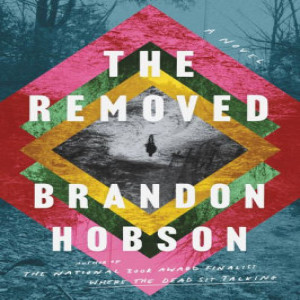
Monday Feb 08, 2021
Monday Feb 08, 2021
Show Notes and Links to Brandon Hobson’s Work and Allusions/Texts from Episode
On Episode 40, Pete talks with Brandon Hobson about his most recent books, Where the Dead Sit Talking, and The Removed. The conversation touches upon many topics, including the (well-deserved) buzz around The Removed, published on Feb. 2, the quiet alchemy that created these two great books, crafted in different ways but both profound, stereotypical and racist depictions of Natives in the distant past and today, ideas of loss and trauma and justice, and much more.
Don’t miss the movie references, either!
Dr. Brandon Hobson is the author of the novel, The Removed, as well as Where the Dead Sit Talking, which was a finalist for the 2018 National Book Award and winner of the Reading the West Award. His other books include Desolation of Avenues Untold and Deep Ellum. He received his PhD in English/creative writing from Oklahoma State University. His fiction has won a Pushcart Prize and has appeared in such places as McSweeney’s, Conjunctions, NOON, and elsewhere. Hobson is an assistant professor of creative writing at New Mexico State University and also teaches at the Institute of American Indian Arts. He is an enrolled citizen of the Cherokee Nation Tribe of Oklahoma.
Buy The Removed Here (Bookshop) and Here (Amazon)
The Removed Featured on Oprah Magazine's 55 of the Most Anticipated Books of 2021
Brandon Hobson’s Personal Website
The Removed Featured as March 2021 Pick for Roxane Gay’s Audacious Book Club
Brandon Hobson discusses The Removed on NPR’s “All Things Considered”
The Removed: Publisher's Weekly Review
The Removed: Book Review by NPR
-at about 3:00-Brandon talks about how he’s feeling three days after publication of his long-awaited novel, The Removed
-at about 10:10: Brandon discusses his book Desolation of Avenues Untold, his PhD dissertation
-at about 12:55: Brandon discusses his interest in being a versatile writer, one who writes in different genres and about different topics/themes
-at about 14:35: Brandon discusses the possible allusions in The Removed to DFW (David Foster Wallace) and Venery, a character whose name may betray his “carnal” urges, as part of a larger discussion of subjectivity in reading
-at about 17:05 Brandon talks about the places where he finds “fun” in writing, and where nonfiction and research enter that equation; he cites his friend David Heska Wanbli Weiden’s recent nonfiction work, and William T. Vollman as a sort of “trickster” in his work
-at about 20:30: Brandon discusses Where The Dead Sit Talking, his 2018 novel that was a finalist for The National Book Award, and about how “so much of the book is about communication
-at about 23:45: Brandon discusses the historical importance of Sequoyah, after whom the protagonist is named
-at about 26:05-Brandon talks about “home” and “communication” as two major themes in Where The Dead Sit Talking
-at about 27:15, Brandon talks about the ambiguity of events from Where The Dead Sit Talking, leading Pete and Brandon to discuss A Separate Peace and other texts full of ambiguity, which a lot of readers don’t like, but Pete and Brandon do
-at about 30:55, Brandon talks about creating “sympathetic”/”empathetic” characters and how his career in social work informed his writing certain characters
-at about 35:15, Brandon talks about the connection between Rosemary and Sequoyah in Where The Dead Sit Talking
-at about 41:25, Brandon reads and discusses the ending of Where The Dead Sit Talking
-at about 44:35, Brandon talks about his subtle and non-so-subtle depictions of Native American generalizations/stereotypes
-at about 45:10, Brandon talks about the background of/impetus for writing The Removed, particularly the lack of attention on police killings of Native youth and healing from trauma; Brandon draws the links between historical systematic violence against Natives, and systematic violence in modern times
-at about 49:35, Brandon talks about negative and outdated and lacking portrayals of Natives in cinema, mentioning Sterling Harjo, Tommy Orange (with his There, There) and Lucas Brown Eyes and many others who are fighting for equal representation in Hollywood and debunking stereotypes
-at about 55:20, Brandon speaks about the importance of the Echota last name in The Removed, and the significance of the name’s history as a disastrous treaty for the Cherokee people
-at about 58:50, Brandon describes the background of “The Darkening Land” and why he chose it for Edgar’s storyline, and Pete compares the skillful way that Brandon uses tension to Adam Sandler's similar journey in Uncut Gems (warning-the article uses explicit language)
-at about 1:02:25, Brandon discusses the emotional renderings in the book, particularly with regard to Maria and the whole Echota family in dealing with the trauma of Ray-Ray’s violent death, as well as the crucial scene with Maria and the police officer who killed Ray-Ray
-at about 1:04:20-Pete and Brandon discuss the breath-of-fresh-air that is the character of Wyatt, the “old soul” foster child who joins the Echota family
-at about 1:06:35-Brandon reads from the ending of The Removed
You can now subscribe to the podcast on Apple Podcasts, and leave me a five-star review. You can also ask for the podcast by name using Alexa, and find the pod on Spotify and on Amazon Music. Follow me on IG, where I’m @chillsatwillpodcast, or on Twitter, where I’m @chillsatwillpo1.
This is a passion project of mine, a DIY operation, and I’d love for your help in promoting what I’m convinced is a unique and spirited look at an often-ignored art form.
The intro song for The Chills at Will Podcast is “Wind Down” (Instrumental Version), and the other song played on this episode was “Hoops” (Instrumental)” by Matt Weidauer, and both songs are used through ArchesAudio.com.
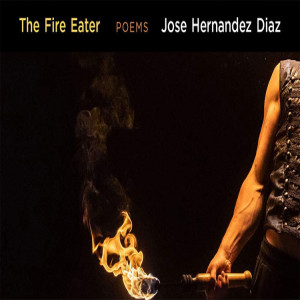
Friday Jan 29, 2021
Episode 39 with Outstanding Prose Poet and Surrealist, Jose Hernandez Diaz
Friday Jan 29, 2021
Friday Jan 29, 2021
On Episode 39 of The Chills at Will Podcast, Pete has the pleasure to be joined by the talented prose poet José Hernández Diaz.
Jose Hernandez Diaz is a 2017 NEA Poetry Fellow. He holds degrees in English and Creative Writing from the University of California at Berkeley and Antioch University Los Angeles. His The Fire Eater: Poems has been described as follows: “Surreal, playful, and always poignant, the prose poems in Jose Hernandez Diaz’s masterful debut chapbook introduce us to a mime, a skeleton, and the man in the Pink Floyd t-shirt, all of whom explore their inner selves in Hernandez Diaz’s startling and spare style. With nods to Russell Edson and the surrealists, Hernandez Diaz explores the ordinary and the not-so-ordinary occurrences of life, set against the backdrop of the moon, and the poet’s native Los Angeles.”
Show Notes and Links to José Hernández Diaz’s Work
Jose Hernandez Diaz Page at The Poetry Foundation
The Fire Eater: Poems-buy it here (Bookshop)
The Fire Eater: Poems-buy it here (Amazon)
Surrealism defined by The Poetry Foundation
Talking Points/Authors/Books Mentioned and Allusions Referenced During the Episode:
José talks about growing up, speaking Spanish and English in different contexts, and living in Buena Park and Norwalk-at about 3:40
José talks about “Chicanismo”/”Mexican-American” and similar terms-at about 6:45
José talks about his childhood and adolescent days as basketball-obsessed and how complimentary words from a high school teacher, Mrs. Weir, helped him believe in his writing abilities-at about 9:00
José talks about being drawn to Salinger’s Catcher in the Rye as a formative book, due to its subject matter and “everyday language”-at about 11:00
José talks about often sending copies of literary journals in which he’s been published to Mrs. Weir, his life-changing teacher and about his early writing for an “American Dream” prompt where the essay was well-received; the essay was based on Rage Against the Machine’s “Wake Up”-at about 11:55
José talks about another formative writing experience, a college assignment in which he successfully bucked tradition to make a point about tradition-at about 13:00
José and Pete talk about their shared appreciation of the politically-active Rage Against the Machine-at about 14:00
José talks about his college experience and his appreciation for the culture of Cal Berkeley-at about 15:40
José talks about MF Doom and his influence on José as a person and as a writer-at about 16:30
José talks about the beginning of his publishing career with “The Border Within” in response to SB1070-at about 17:30
José talks about what has been chill-inducing for him, including Snake Poems by Francisco Alarcon, and writers including Ray Gonzalez, Richard Garcia, Marosa DiGiorgio-at about 19:20
Pete and José talk about José’s appreciation for Octavio Paz as a chill-inducing writer and a bit about his writing style-at about 20:15
José talks about the creative aspect and the “freedom” that comes with surrealism, as Pete and José talk about some defining characteristics of the genre, as well as its connections to magical realism-21:30
José talks about the themes and background of The Fire Eater: Poems-at about 26:10
José talks about bringing together non sequiturs and disparate ideas to make surrealist poetry, as well as how his music listening history, his voracious reading, and living a “minimalist” lifestyle helps him nail the “sound” of his own poetry-at about 27:30
José reads and discusses his “Cuauhtémoc Xochipilli"-at about 30:25
Pete reads José’s “The Longboard” from The Fire Eater: Poems, and José talks about its significance and background-at about 36:45
José talks about his writing schedule and daily life as a writer-at about 39:20
José talks about prose poetry and about his future projects, including his first teaching gig coming up-at about 42:00
José shouts out current writers who he really enjoys, including Michael Torres, Felicia Zamora-at about 44:20
If you have enjoyed The Chills at Will Podcast, pause your podcast player right now, and go to Apple Podcasts to leave me a nice review.
You can also ask for the podcast by name using Alexa, and find the pod on Spotify and on Amazon Music. Follow me on IG, where I’m @chillsatwillpodcast, or on Twitter, where I’m @chillsatwillpo1.
This is a passion project of mine, a DIY operation, and I’d love for your help in promoting what I’m convinced is a unique and spirited look at an often-ignored art form.
The intro song for The Chills at Will Podcast is “Wind Down” (Instrumental Version), and the other song played on this episode is “Hoops” (Instrumental)” by Matt Weidauer, and both songs are used through ArchesAudio.com.
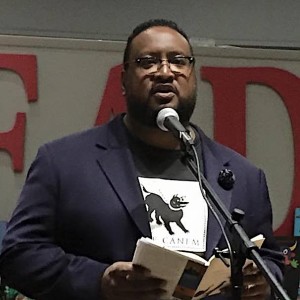
Monday Jan 25, 2021
Monday Jan 25, 2021
Show Notes and Links to F. Douglas Brown’s Work:
Reading at Writer’s Resist 2020
Video-"Poetry and Discernment: An Ignatian Conversation with F. Douglas Brown"
Writers/Texts Mentioned and Allusions Referenced During the Episode:
Doug talks about growing up in San Francisco and being inspired the Bay Area literary and artistic scene, including the great Diane DiPrima, Bob Haas, and his own mother, an artist herself -at about 4:30
Doug talks about his father’s outsized influence on him, through his father’s charm, gregarious nature, and steadfastness-at about 8:00
Doug reads a poem, “Hard Uncles,” about his father, published in the Virginia Quarterly Review-at about 11:00
Doug describes reciting the above poem in his father’s home state of Mississippi at a couple of readings and how special the events were, as well as how “connection” is so crucial in poetry, as demonstrated by poet great Sterling Brown-at about 15:40
Doug talks about his mother’s big influence on him, including her artistic and creative nature-at about 17:40
Doug talks about the significance of his full name, passed down from his father, and of course, the iconic abolitionist, Frederick Douglass-at about 21:35
Doug talks about the genesis of his work based on Jacob Lawrence’s panels of Frederick Douglass, as well as the role of ekphrasis and the “muse” in Doug’s own work and study-at about 24:40
Doug shows some artistic renderings of Frederick Douglass and talks about how he views Douglass and how Douglass has influenced his own work-at about 29:00-33:00
(AROUND THIS TIME, THE AUDIO WOULD BE GREATLY ENHANCED BY BEING ABLE TO SEE THE VISUALS DOUG PUTS UP AND REFERENCES-THEY CAN BE FOUND AT ABOUT 32:50 ON THE YOUTUBE RECORDING HERE)
Doug talks about Natasha Trethewey and his admiration for her work-at about 32:00
Doug reads his poem based on Jacob Lawrence’s rendering of Frederick Douglass and his overseer: “Mr. Covey, Shall We Dance?”-at about 39:10
Doug talks about chill-inducing writers for him, including the dynamic and uber-talented Tongo Eisen-Martin, recently named San Francisco Poet Laureate, Ross Gay, Natasha Trethewey, Tracy K. Smith, Mahogany Browne, Doug’s frequent collaborator, Geffrey Davis, Terrence Hayes, and Kimiko Hahn -at about 43:30
Doug talks about the powerhouse writing collective Cave Canem and its history, mission and accomplishments, including its inception in 1996, founded by Toi Derricotte and Cornelius Eady-at about 47:00
Doug and Pete talk about the brilliant poets Jericho Brown and Amanda Gorman, who recently read at the Biden/Harris Inauguration, as well as Michael Cirelli’s help in advancing youth poetry-at about 50:45
Doug talks about Zero to Three, his award-winning poetry collection-at about 53:20
Doug reads “Epistemology of Laundry” and discusses its themes, particularly of the father-son bond-at about 58:20
Doug talks about the Sandra Bland Reading Series, including its ethic of downplaying the artist and lifting up the art, as seen with Amanda Johnston, Jonterri Gadson, Jericho Brown, and Mahogany Browne and their organization, Black Poets Speak Out-at about 1:03:45
Doug talks about his job and vocation as a high school educator and how he is able to integrate his art into the classroom-at about 1:10:30
Doug talks about some favorite texts to teach in his classroom, including the contemporary "To the Notebook Kid" by Eve L. Ewing, and Ocean Vuong’s “Someday I’ll Love Ocean Vuong”-at about 1:13:45
Doug talks about upcoming projects, including two essays coming out this spring, in the anthology Teaching Black and through the Langston Hughes Center-at about 1:18:00
Doug talks about his DJing and his music influences-at about 1:23:00
Doug talks about mixtapes and their importance in his current DJ crew, with their shared need for mourning lost loved ones, particularly by dedicating poems/music to parents-at about 1:24:30
Pete and Doug resist the “in my day” hip-hop attitude-at about 1:27:45
Pete shouts out the Dissect Podcast, an incredible analysis of one hip-hop album per season, through a “close read”-at about 1:29:35
Doug reads four sonnets that have been written recently, full of allusions and inspired by his DJ crew (sonnet is entitled “A DJ Spins the Blues”); he talks about the significance of the poem and how we honor our parents and their legends-at about 1:31:00

Monday Jan 18, 2021
Monday Jan 18, 2021
Show Notes and Links to Jon Finkel’s Work
On Episode 37, Pete is honored to talk with Jon Finkel, the award-winning author of Hoops Heist, The Life of Dad, Jocks In Chief, The Athlete, Heart Over Height, “Mean” Joe Greene and more. His books have been endorsed by everyone from Mark Cuban and Tony Dungy to Spike Lee, Kevin Durant and Chef Robert Irvine. He has written for GQ, Men’s Health, Yahoo! Sports, The New York Times and has appeared on CBS: This Morning, Good Morning Texas, and hundreds of radio shows, podcasts and streams.
Jon's 2020 book, Hoops Heist: Seattle, the Sonics, and How a Stolen Team's Legacy Gave Rise to the NBA's Secret Empire, can be found wherever books are sold.
Article from 2013 about Nate Robinson's Incredible Leaping Ability
Buy Hoops Heist here! (Bookshop)
Buy Hoops Heist here! (Amazon)
“Notable mention” in The Best American Sports Writing anthology in 2017: Basketball in the Driveway
Authors/Books Mentioned and Allusions Referenced During the Episode:
-at around 2:45-Jon Finkel talks about his love of reading as a kid, particularly sports biographies, and his family’s love of sports
-at around 5:15-Jon talks about the childhood athletic battles between he and his brother, echoed by Pete with he and his brothers’ battles, especially in basketball
-at around 7:00-Jon and Pete wax nostalgic and poetic about the “old days” and Sports Illustrated as a print magazine juggernaut and some of the great writers (Steve Rushin was Jon’s favorite)
-at around 10:45-Jon talks about his luck in growing up in Boston and reading all-star journalists like Jackie McMullen, Bob Ryan, Leigh Montville, and more
-at around 11:45-Jon and Pete talk about SÍ for Kids icon Buzz Beamer
-at around 12:35-Jon talks about “chills at will” in his own reading history, including Rick Reilly’s “Life of Reilly” and Jim Murray’s The Great Ones
-at around 18:20-Jon talks about his college and post-graduate education in writing, both in the classroom and outside
-at around 22:00-Jon talks about working in Hollywood through building sets on The Man Show and soon writing some for the show
-at around 23:00-Jon talks about his self-education in writing a query letter and debuting with Men’s Fitness after inquiring about writing an article in which he would train and learn to dunk
-at around 24:50-Jon talks about the article that was published following his query
-at around 25:55-Pete and Jon discuss story ideas of theirs that had great potential but have exceeded their statute of limitations; Jon talks about training for the NFL combine and competing in a high-level volleyball for prospective articles; Pete talks about his perfect setup for a book idea about dunking-one that got away
-at around 31:35-Jon talks about his early writing for Men’s Health and Men’s Fitness and beginning by writing personal profiles that ended up becoming consistent cover stories
-at around 34:45-Jon talks about the balance between commerce and art, particularly in writing aesthetically-pleasing prose and also satisfying advertisers
-at around 38:45-Jon tells two incredibly unique Karl Malone stories, one involving a photo shoot, and one involving Kobe Bryant
-at around 45:45-Jon talks about his personal relationship with Nate Robinson and how it led to his first book, Heart over Height
-at around 48:45-Jon talks about Dadvantage: A Blueprint for New Fathers to Stay in Shape on No Sleep, with No Time and No Equipment and The Life of Dad: A Blueprint for New Fathers to Stay in Shape on No Sleep, with No Time and No Equipment; he also talks about
-at around 52:45-Jon talks about how he and Isaiah Thomas’ Slow Grind Media managed to write and publish his most-recent book, the outstanding Hoops Heist, in a pandemic year
-at around 54:50-Pete and Jon talk about how the structure of the book (Part I as Seattle and Sonics history; Part II as the legacy of Seattle’s close-knit basketball community) adds to its power
-at around 57:45-Jon talks about the importance of using present tense to solidify perspective, including adding to the pathos when the reader experiences the last days of the Seattle NBA franchise as described in the book
-at around 1:00:05-Jon reads from Hoops Heist and discusses Bill Russell, his greatness, his resentments, the media, and racism
-at around 1:04:30-Jon discusses the iconic 90s Sonics
-at around 1:05:45-Jon discusses the basketball camps and incredible cooperation and fraternity of Seattle basketball, and how Seattle truly is a special and welcoming basketball family
-at around 1:10:05-Pete (cringe) drops a bar from a freestyle about Doug Christie
-at around 1:10:30-Jon talks upcoming projects, including some cool ideas for “bite-sized bios” and a documentary based on Hoops Heist
If you have enjoyed The Chills at Will Podcast, pause your podcast player right now, and go to Apple Podcasts to leave me a nice review.
You can also ask for the podcast by name using Alexa, and find the pod on Spotify and on Amazon Music. Follow me on IG, where I’m @chillsatwillpodcast, or on Twitter, where I’m @chillsatwillpo1.
This is a passion project of mine, a DIY operation, and I’d love for your help in promoting what I’m convinced is a unique and spirited look at an often-ignored art form.
The intro song for The Chills at Will Podcast is “Wind Down” (Instrumental Version), and the other song played on this episode was “Hoops” (Instrumental)” by Matt Weidauer, and both songs are used through ArchesAudio.com.
